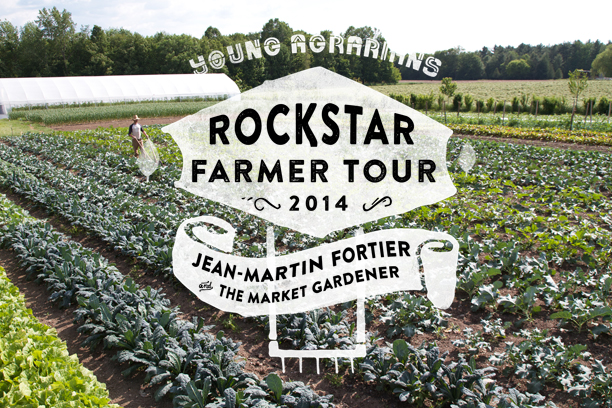
Recently, we had the good fortune to sit through a day-long PowerPoint workshop in Victoria. I know, ‘good fortune’ and ‘day-long’ shouldn’t be affiliated in the same sentence, especially when PowerPoint is involved! In this case, it was, as they say, all good.
Sunday’s session was the last stop on the Young Agrarians Rock Star Farmer Tour featuring Jean Martin Fortier, a young farmer from Eastern Quebec who was on the road promoting a new book The Market Gardener, which has just been published in English by New Society Publishers. The original book was in French and was published several years ago.
Fortier engaged the audience for nearly seven hours, describing and showing us his intensive farming methods that provide annual sales of close to $140,000 (with 45% net profit, excluding owner labour). His operation produces enough vegetables on 1.5 acres to be able to feed more than 200 families through his CSA, market stands and local food establishments. You read that correctly, one and one-half acres feed 200 families.
I have been mulling agriculture’s future for the past few months, driven mostly by documentary films, books and online ranting and raving presenting terrible pictures of the state of the world, and as a sidebar, the world’s agriculture industry. Genetically-modified foods, ever-increasing energy costs, climate change, California’s record breaking drought, the lack of life in the soils of the plains of Canada and the U.S. – these are only a few of the bleak prospects I have been reading about.
Jean Martin Fortier gave me some hope! His farm is run on proven, organic methods, sensible business savvy and, unless he had us all fooled, a deep respect and love for his land. He gives genuine hope that small scale farming can be productive and sustainable, as well as economically-viable and an affordable career option for a new generation of young, would-be farmers.
Fortier’s secret? The use of scale-appropriate tools and technologies allows intensive production methods while maintaining soil health and an ecologically sound use of the environment. He claimed to love tractors but then explained that he didn’t use one because they wasted land, used too much fuel and cost too much to buy. He went so far as to say, “if a neighbour wants to give you an old tractor, don’t take it. . . it won’t work for you.”
His farm is run using hand tools like broad forks, seeders, hoes and flame weeders. Vegetables are protected in low tunnels, high tunnels, hoop houses and tarps. To be fair, the land is worked with a two-wheel Italian “tractor” that can be used to till soil, harrow soil, mow cover crops and tow a wagon if needed. My impression was that this machine wasn’t used as much as the spades, forks, hoes and rakes lined up on Fortier’s shed wall.
The take-away for me after a full day of slides, stories and questions from the mostly under-40 audience was that agriculture may have some bumps in the road to contend with, but with options like those described by Jean Martin Fortier, and the enthusiasm of the young farmers and farmers-to-be, we’re going to be in good hands. And I just might have to try this intensive farming thing on a little piece of our five acres!
Jean Martin Fortier’s book is available directly from his website themarketgardener.com, or from Amazon.ca. It’s worth the read if you’re interested in providing healthy vegetables for your family, your neighbours and the world!

